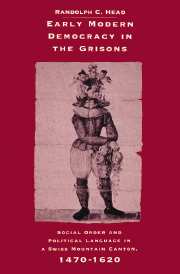 Early Modern Democracy in the Grisons
Early Modern Democracy in the Grisons Book contents
- Frontmatter
- Contents
- List of illustrations
- List of tables
- Acknowledgments
- Note on languages, orthography, and translations
- Abbreviations
- INTRODUCTION: Social order, politics, and political language in Graubünden, 1470–1620
- 1 Communalism and other political models in Europe and in Graubünden
- 2 Graubünden to 1520: geography, society, history
- 3 Local practice and federal government in the Freestate
- 4 From consolidation to communal politics: the Freestate, ca. 1530–1580
- 5 Elite power and popular constraint in sixteenth-century Rhaetia
- 6 Reform, communal action and crisis, ca. 1580–1639
- 7 Political language and political cosmology during the crisis years
- CONCLUSION: Democracy in early modern Graubünden
- Bibliography
- Index
- CAMBRIDGE STUDIES IN EARLY MODERN HISTORY
3 - Local practice and federal government in the Freestate
Published online by Cambridge University Press: 14 October 2009
- Frontmatter
- Contents
- List of illustrations
- List of tables
- Acknowledgments
- Note on languages, orthography, and translations
- Abbreviations
- INTRODUCTION: Social order, politics, and political language in Graubünden, 1470–1620
- 1 Communalism and other political models in Europe and in Graubünden
- 2 Graubünden to 1520: geography, society, history
- 3 Local practice and federal government in the Freestate
- 4 From consolidation to communal politics: the Freestate, ca. 1530–1580
- 5 Elite power and popular constraint in sixteenth-century Rhaetia
- 6 Reform, communal action and crisis, ca. 1580–1639
- 7 Political language and political cosmology during the crisis years
- CONCLUSION: Democracy in early modern Graubünden
- Bibliography
- Index
- CAMBRIDGE STUDIES IN EARLY MODERN HISTORY
Summary
Just as the Rhaetians, joined by their Leagues
Divide all offices among them, to noblemen
But also to men from the people,
So they are accustomed to gather as a common resource
All the taxes that are paid to them each year;
Then they divide it, partly by heads,
Dividing it man by man,
And partly according to wealth,
In the opinion that they can better protect their freedom
And control the powerful in this fashion,
By keeping absolutely nothing in a public treasury.
Franciscus Niger, 1543Throughout the fifteenth and into the sixteenth centuries, Rhaetians drew upon their experience of communal life to construct the system of alliances that culminated in the Bundesbrief of 1524. After 1524, communal values and practices continued to provide organizational models for the institutions and political culture of the Freestate. Public assembly, majority decision, and publicly controlled division of benefits and resources were characteristic practices that deeply influenced both the form of the Freestate and the political ideas of its inhabitants. Yet the application of local practices to larger problems was not automatic and reflexive; instead, federal institutions derived from a range of possibilities among which local practice was only one. The extension of communal values to the Freestate did not, therefore, result in structures identical to those found in the communes. Rhaetians also drew on other models of political order to arrive at results consistent with, but not directly based on, communal principles.
- Type
- Chapter
- Information
- Early Modern Democracy in the GrisonsSocial Order and Political Language in a Swiss Mountain Canton, 1470–1620, pp. 73 - 117Publisher: Cambridge University PressPrint publication year: 1995
- 1
- Cited by


